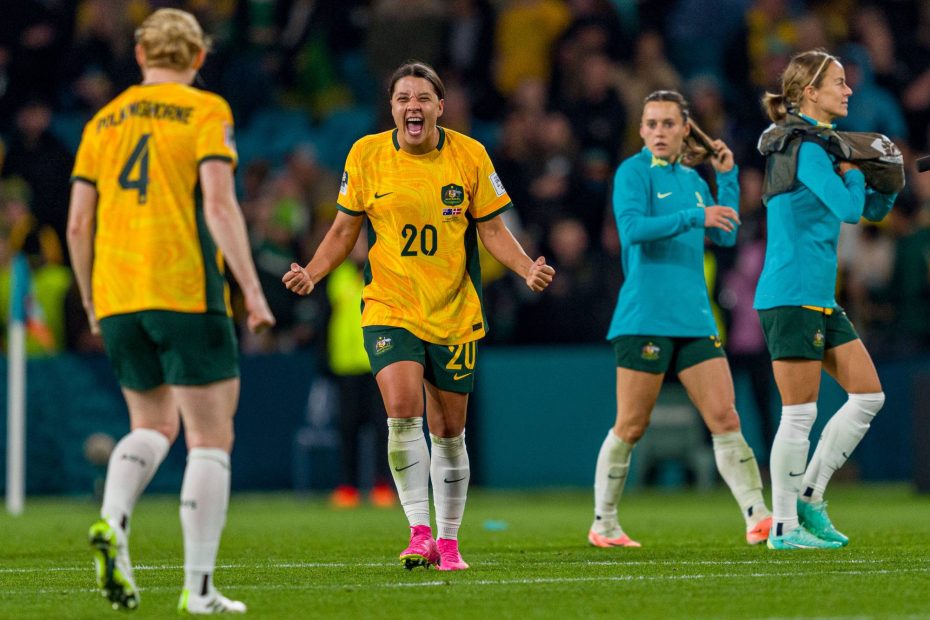After the astronomical ratings achieved during the Matildas’ run to the semi-finals of the Women’s World Cup and the continued levels of support given to the Socceroos’ stellar efforts on the world stage, the soon-to-be-announced corporate broadcast deal that embraces Australia’s national football teams should be one of the most financially significant ever seen in Australia.
The eyeballs on the Matildas during their World Cup run were unprecedented. The figures blew every sport, event, tournament and/or games into oblivion, much to the chagrin of plenty of supporters of the colonial endeavours that have for too long denied the game the support it deserved.
State of Origin and AFL Grand Final figures were obliterated, not just smashed, and Australia finally stepped into the new world, where the world game teased the nation in terms of exactly just how big it could become in the long term.
Sam Kerr. (Photo by Andy Cheung/Getty Images)
For many of us, it was no surprise. Yet for the odd knuckle-dragging Neanderthal intent on deriding the sport based on rather primeval and simplistic references to cowardice and simulation, the bigger picture remained beyond them.
Football continues to surge in participation across Australia, with the women’s game leading the way and never before have more young and exciting players been plying their trade in overseas leagues; ever respected thanks to the performances of both the Matildas and the Socceroos.
It does seem that, with the head trauma issues in the collision sport of rugby league ever increasing, the isolationist and protectionist policies stemming from AFL House in Melbourne remaining nothing but bully-boy tactics in a narrow market and the erosion of rugby union from within, as the suits bicker and stab to the point of hilarity, football might finally be positioned to take advantage.
Especially at an international level, with the Matildas and Socceroos at unprecedented levels of popularity. Yet what exactly are Australia’s international football teams worth?
The AFL and NRL both desperately sought billion-dollar deals in the recent past. The southerners managed a $4.5 billion arrangement across seven years, which the code hoped would settle the nerves post-pandemic and continue to provide the cash required to prop up struggling AFL clubs and the AFLW as a whole.
NRL folk were a little underwhelmed when their $2 billion deal was struck across the 2023-2027 seasons, and the AFL appeared to have taken a firm and dominant position, yet both were struck prior to the latest Socceroos efforts at the World Cup and the Women’s team’s gallant run on home soil.
That begs a very simple question.
Considering the near 11 million Aussies that were watching the Matildas do battle in the World Cup semi-final against England, and the somewhere near three million who tuned in to watch the AFL and NRL deciders respectively, are the rights to Australia’s football teams now far more valuable than both?
The domestic codes will always be limited by restricted interest and an insular mindset that disparages football at their own expense, while rugby union appears hell-bent on killing itself at the grassroots thanks to excessive investment in middle management.
Ruggers’ ignorant approach to development and growth appears to hold a fanciful view that top-tier players will appear by magic, as ex-players and administrators continue to pursue self-interest in the game, and the code simply withers on the vine at the community level.
Football Australia CEO James Johnson spoke recently of the undergoing negotiations around the portion of the game governed by the body he leads.
Where the next APL, A-Leagues and Paramount+ deal lands will be an interesting watch, but in terms of Johnson’s hand in negotiations as he looks to lock in the broadcast arrangements for the national terms in the short term, the most significant administrator in the land does appear to hold a hand of aces.
With an Asian Cup on the Horizon for the men’s team, the Matildas heading off to the Olympics in France next year and the Socceroo’s World Cup qualifiers coming on thick and fast across the next 12 months, he should be asking top price and then demanding more.
Football has a broadcast earning capacity like no other national endeavour and if Football Australia have played their cards right, the benefits could be extreme and unparalleled.
If Johnson sells the international game short to the corporates, many will be incredibly disappointed. However, if he has indeed got the basics of a mega deal across the line, as he alluded to last week, the game will benefit greatly and the wave of interest in the domestic game will continue to feed into the well-funded and successful national teams.
Sports opinion delivered daily
Australian football is looking as good as it ever has and the national teams broadcast deal will hopefully reflect that fact, with the other codes ever wary of the yawning giant that is football in Australia.
